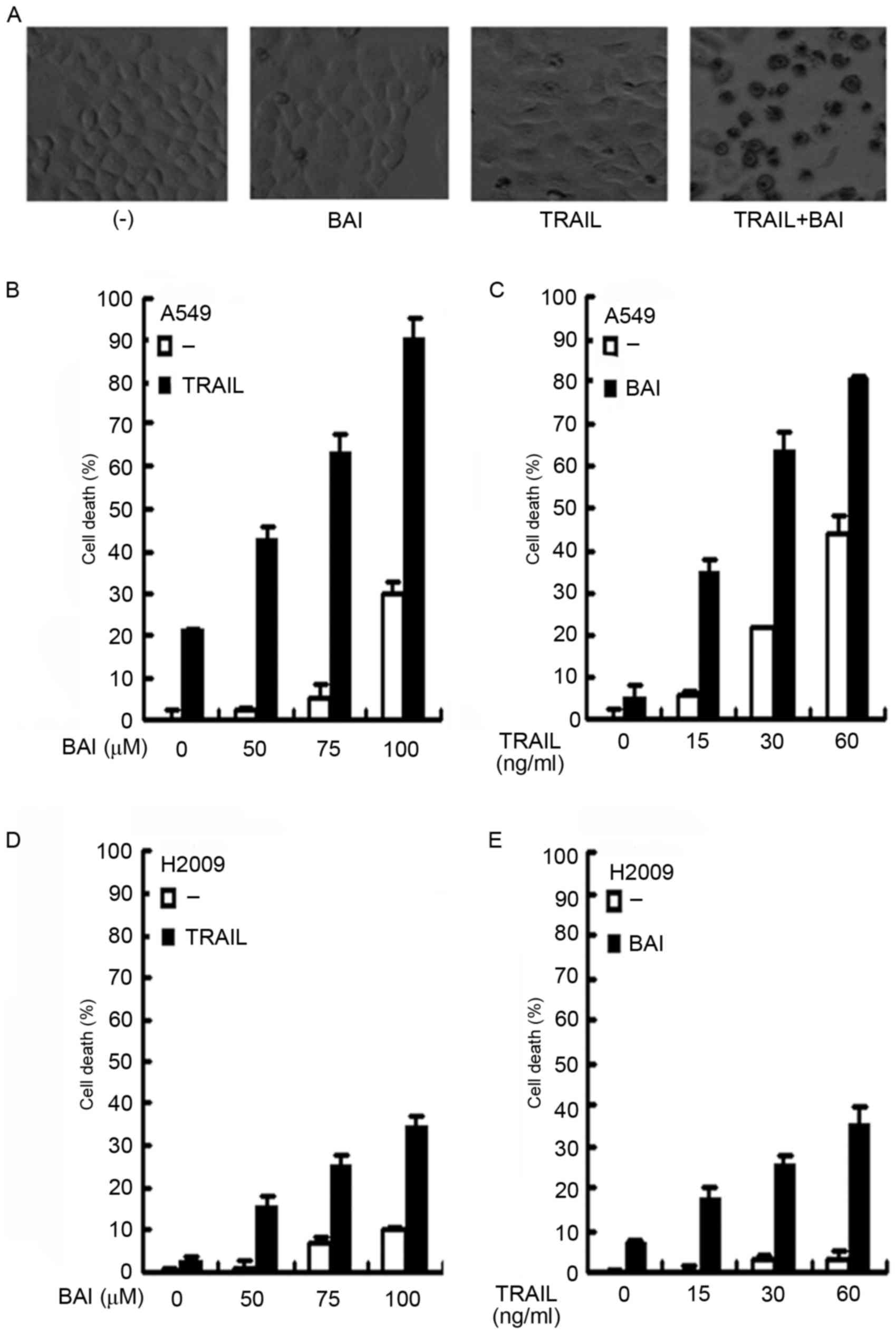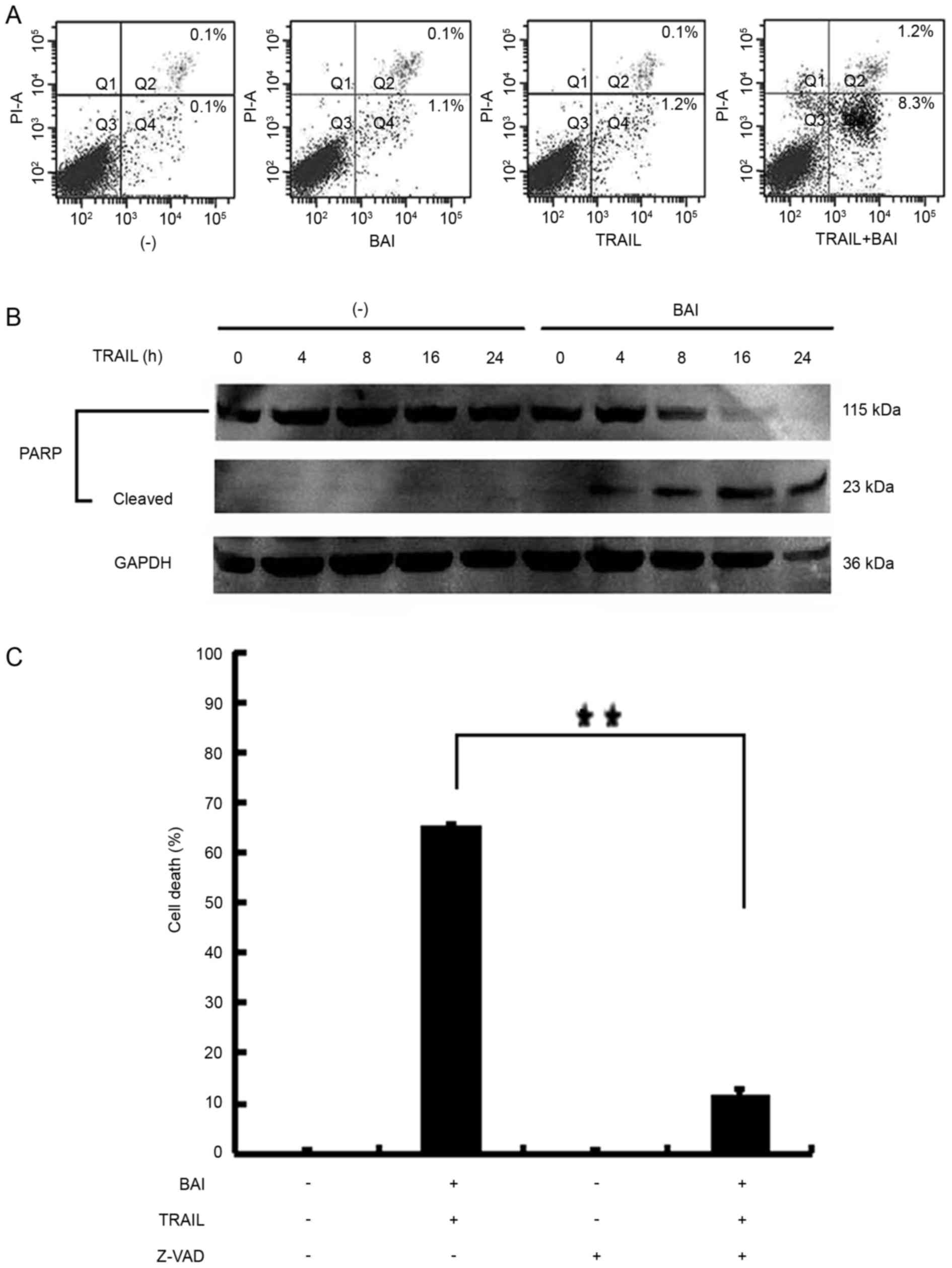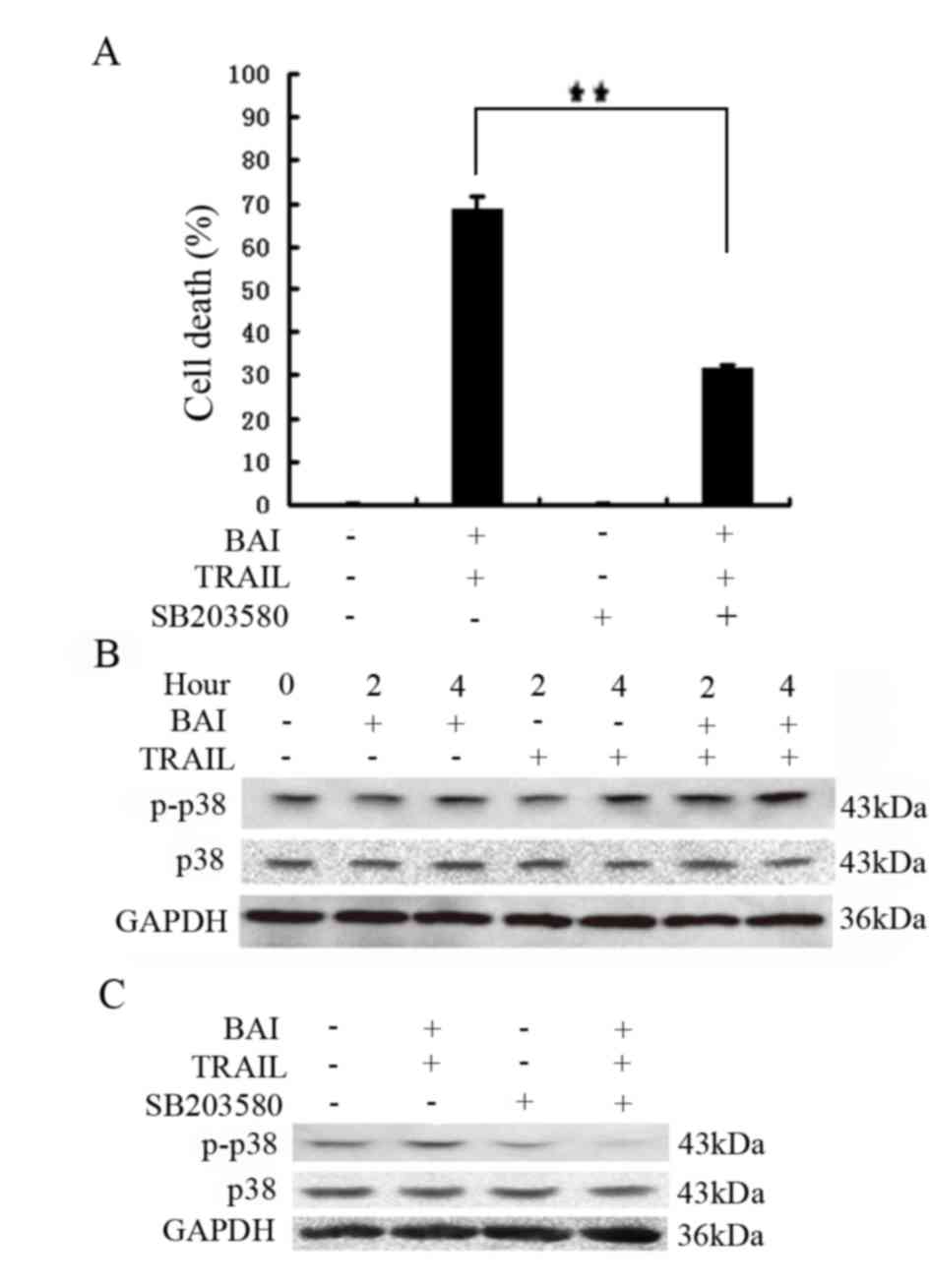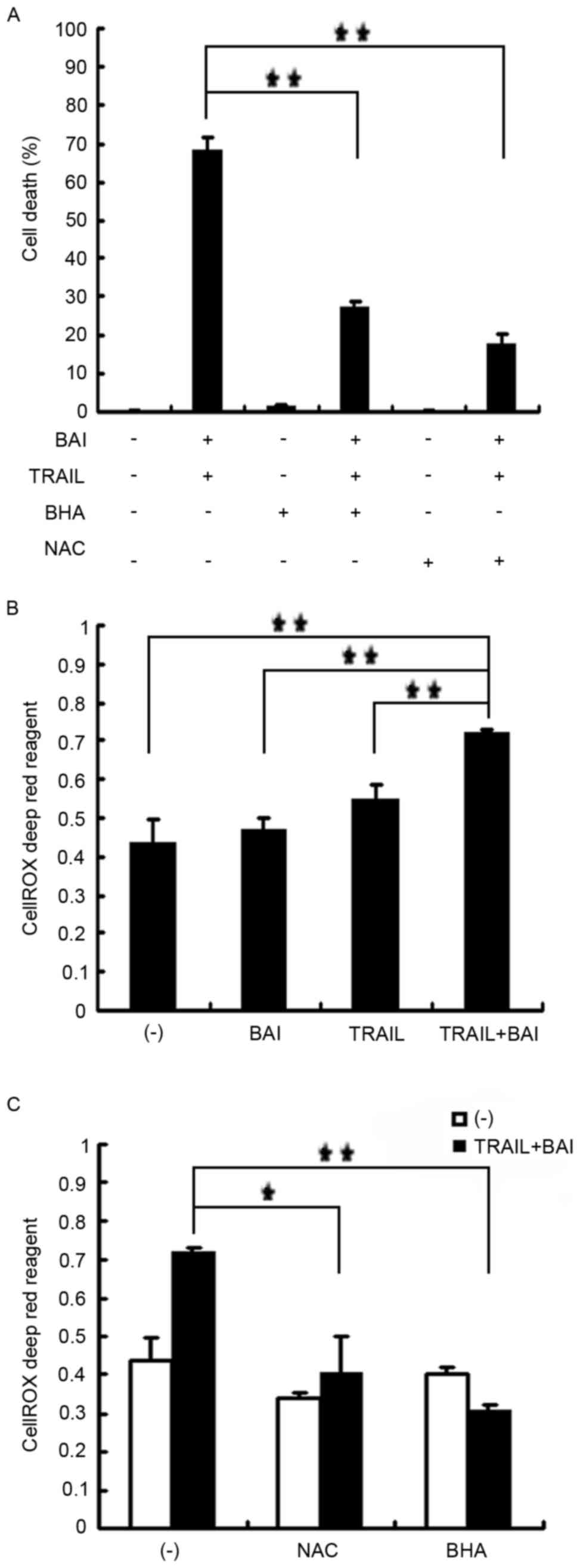|
1
|
Emery JG, McDonnell P, Burke MB, Deen KC,
Lyn S, Silverman C, Dul E, Appelbaum ER, Eichman C, DiPrinzio R, et
al: Osteoprotegerin is a receptor for the cytotoxic ligand TRAIL. J
Biol Chem. 273:14363–14367. 1998. View Article : Google Scholar : PubMed/NCBI
|
|
2
|
Grotzer MA, Eggert A, Zuzak TJ, Janss AJ,
Marwaha S, Wiewrodt BR, Ikegaki N, Brodeur GM and Phillips PC:
Resistance to TRAIL-induced apoptosis in primitive neuroectodermal
brain tumor cells correlates with a loss of capase-8 expression.
Oncogene. 19:4604–4610. 2000. View Article : Google Scholar : PubMed/NCBI
|
|
3
|
Wang X, Chen W, Zeng W, Bai L, Tesfaigzi
Y, Belinsky SA and Lin Y: Akt-mediated eminent expression of c-FLIP
and Mcl-1 confers acquired resistance to TRAIL-induced cytotoxicity
to lung cancer cells. Mol Cancer Ther. 7:1156–1163. 2008.
View Article : Google Scholar : PubMed/NCBI
|
|
4
|
Yang J, Li G and Zhang K: Pro-survival
effects by NF-κB, Akt and ERK(1/2) and anti-apoptosis actions by
Six1 disrupt apoptotic functions of TRAIL-Dr4/5 pathway in ovarian
cancer. Biomed Pharmacother. 84:1078–1087. 2016. View Article : Google Scholar : PubMed/NCBI
|
|
5
|
Li K and Sheu S: Determination of
flavonoids and alkaloids in the scute-coptis herb couple by
capillary electrophoresis. Anal Chim Acta. 313:113–120. 1995.
View Article : Google Scholar
|
|
6
|
Srinivas NR: Baicalin, an emerging
multi-therapeutic agent: Pharmacodynamics, pharmacokinetics, and
considerations from drug development perspectives. Xenobiotica.
40:357–367. 2010. View Article : Google Scholar : PubMed/NCBI
|
|
7
|
Lee D, Ko WK, Hwang DS, Heo DN, Lee SJ,
Heo M, Lee KS, Ahn JY, Jo J and Kwon IK: Use of baicalin-conjugated
gold nanoparticles for apoptosis induction of breast cancer cells.
Nanoscale Res Lett. 11:3812016. View Article : Google Scholar : PubMed/NCBI
|
|
8
|
Orzechowska B, Chaber R, Wiśniewska A,
Pajtasz-Piasecka E, Jatczak B, Siemieniec I, Gulanowski B, Chybicka
A and Błach-Olszewska Z: Baicalin from the extract of Scutellaria
baicalensis affects the innate immunity and apoptosis in leukocytes
of children with acute lymphocytic leukemia. Int Immunopharmacol.
23:558–567. 2014. View Article : Google Scholar : PubMed/NCBI
|
|
9
|
Huang Y, Hu J, Zheng J, Li J, Wei T, Zheng
Z and Chen Y: Down-regulation of the PI3K/Akt signaling pathway and
induction of apoptosis in CA46 Burkitt lymphoma cells by baicalin.
J Exp Clin Cancer Res. 31:482012. View Article : Google Scholar : PubMed/NCBI
|
|
10
|
Wang X, Ju W, Renouard J, Aden J, Belinsky
SA and Lin Y: 17-allylamino-17-demethoxygeldanamycin
synergistically protentiates tumor necrosis factor-induced lung
cancer cell death by blocking the nuclear factor-kappaB pathway.
Cancer Res. 66:1089–1095. 2006. View Article : Google Scholar : PubMed/NCBI
|
|
11
|
Ju W, Wang X, Shi H, Chen W, Belinsky SA
and Lin Y: A critical role of luteolin-induced reactive oxygen
species in blockage of tumor necrosis factor-activated nuclear
factor-kappaB pathway and sensitization of apoptosis in lung cancer
cells. Mol Pharmacol. 71:1381–1388. 2007. View Article : Google Scholar : PubMed/NCBI
|
|
12
|
Saidani C, Hammoudi-Triki D,
Laraba-Djebari F and Taub M: In vitro studies with renal proximal
tubule cells show direct cytotoxicity of Androctonus australis
hector scorpion venom triggered by oxidative stress, caspase
activation and apoptosis. Toxicon. 120:29–37. 2016. View Article : Google Scholar : PubMed/NCBI
|
|
13
|
Yang L, Wang Q, Li D, Zhou Y, Zheng X, Yan
J, Zhang L, Lin Y and Wang X: Wogonin enhances antitumor activity
of tumor necrosis factor-related apoptosis-inducing ligand in vivo
through ROS-mediated downregulation of cFLIPL and IAP proteins.
Apoptosis. 18:618–626. 2013. View Article : Google Scholar : PubMed/NCBI
|
|
14
|
Refaat A, Abdelhamed S, Saiki I and
Sakurai H: Inhibition of p38 mitogen-activated protein kinase
potentiated the apoptotic effect of berberine/tumor necrosis
factor-related apoptosis-inducing ligand combination therapy. Oncol
Lett. 10:1907–1911. 2015.PubMed/NCBI
|
|
15
|
Walczak H, Miller RE, Arial K, Gliniak B,
Griffith TS, Kubin M, Chin W, Jones J, Woodward A, Le T, et al:
Tumoricidal activity of tumor necrosis factor-related
apoptosis-inducing ligand in vivo. Nat Med. 5:157–163. 1999.
View Article : Google Scholar : PubMed/NCBI
|
|
16
|
Galan-Moya EM, de la Cruz-Morcillo Ma,
Valero M Llanos, Callejas-Valera JL, Melgar-Rojas P, Losa J
Hernadez, Salcedo M, Fernández-Aramburo A, y Cajal S Ramon and
Sánchez-Prieto R: Balance between MKK6 and MKK3 mediates p38 MAPK
associated resistance to cisplatin in NSCLC. PLoS One.
6:e284062011. View Article : Google Scholar : PubMed/NCBI
|
|
17
|
Xie Y, Peng Z, Shi M, Ji M, Guo H and Shi
H: Metformin combined with p38 MAPK inhibitor improves cisplatin
sensitivity in cisplatin-resistant ovarian cancer. Mol Med Rep.
10:2346–2350. 2014. View Article : Google Scholar : PubMed/NCBI
|
|
18
|
Pal HC, Baxter RD, Hunt KM, Agarwal J,
Elmets CA, Athar M and Afaq F: Fisetin, a phytochemical,
potentiates sorafenib-induced apoptosis and abrogates tumor growth
in athymic nude mice implanted with BRAF-mutated melanoma cells.
Oncotarget. 6:28296–28311. 2015. View Article : Google Scholar : PubMed/NCBI
|
|
19
|
Pereira L, Igea A, Canovas B, Dolado L and
Nebreda AR: Inhibition of p38 MAPK sensitizes tumour cells to
cisplatin-induced apoptosis mediated by reactive oxygen species and
JNK. EMBO Mol Med. 5:1759–1774. 2013. View Article : Google Scholar : PubMed/NCBI
|
|
20
|
Shi Y, Nikulenkov F, Zawacka-Pankau J, Li
H, Gabdoulline R, Xu J, Eriksson S, Hedström E, Issaeva N, Kel A,
et al: ROS-dependent activation of JNK converts p53 into an
efficient inhibitor of oncogenes leading to robust apoptosis. Cell
Death Differ. 21:612–623. 2014. View Article : Google Scholar : PubMed/NCBI
|
|
21
|
Zou J, Zou P, Lou Y, Xiao Y, Wang J and
Liu L: The cross-talk between ROS and p38MAPKα in the ex vivo
expanded human umbilical cord blood CD133(+) cells. J Huazhong Univ
Sci Technolog Med Sci. 31:591–595. 2011. View Article : Google Scholar : PubMed/NCBI
|
|
22
|
Chen Z, Jiang H, Wan Y, Bi C and Yuan Y:
H(2)O(2)-induced secretion of tumor necrosis factor-α evokes
apoptosis of cardiac myocytes through reactive oxygen
species-dependent activation of p38 MAPK. Cytotechnology. 64:65–73.
2012. View Article : Google Scholar : PubMed/NCBI
|


















